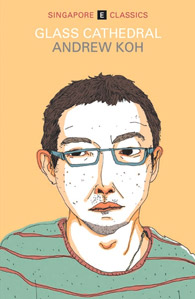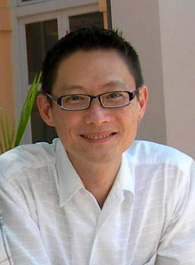When we talk about gay fiction in Singapore, the first title that usually comes up is Peculiar Chris, by Johann S. Lee. That book made a huge splash when it came out in 1992, and though it was criticised as amateurish effort, it’s still fondly remembered today as the country’s first gay novel.

Glass Cathedral, by Andrew Koh, was Singapore’s second-ever gay novel. It didn’t have as huge an impact when it was released, but it was incredibly significant for the gay literary world. It wasn’t just critically praised, it actually won an award: a Commendation in the Singapore Literature Prize in 1994.
The story’s about a university kid named Colin, just out of National Service, who falls passionately in love with a wealthy fellow student named James. Besides the courtship, romance and sex, there’s a lot of exploration of what it means to be gay and Catholic in Singapore: facing both homophobia and calls for evolution of the faith – there’s even a gay priest character thrown into the mix.
It was this focus on religion that made the book so compelling to poet-playwright Robert Yeo, who recently managed to get the book republished as part of Epigram Books’ new Singapore Classics series. This series includes established authors like Yeo himself, Stella Kon, Goh Poh Seng and Lloyd Fernando. Koh’s the youngest of all the authors in the lineup.
Koh currently lives in Australia, but he came back to visit his home ground for the Singapore Writers Festival. He’s staying in the country long enough to do a reading from his novel at BooksActually bookstore this Wednesday at 7.30pm.
I caught up with him recently, and discovered that he’s quite a character – he started out wanting to be a Jesuit priest as a child, but has since led life as a police regular (he signed on to avoid army life), an English Master’s student and a nurse. He also happened to be a founding member of the influential theatre company The Necessary Stage.
He also feels terribly excited and privileged that his novel’s finally being republished. I’ll let him speak in his own words from here on.
æ: Age, sex, occupation, location?

Andrew: 46, obviously male, currently a registered nurse moving into Chinese medicine, based in Sydney.
æ: How long have you been away from Singapore?
Andrew: Since 1996, so it’s been 15 years, thereabouts.
æ: Why did you leave?
Andrew: This is going to sound really clichéd, but I left for love. It’s just too cheesy. I fell in love with my first partner who was an Englishman, and the only way for me to go over there was to train as a nurse. I was in the middle of doing my Master’s degree, and so I was trying to choose between a career as an academic and a relationship.
And then my first partner became ill, and eventually they found out it was a brain tumour. By which time I was already on my way over there to train as a nurse as that was the only way then I could stay in the UK. And when I began my training he passed away. So that kind of threw my whole future really. You go there for love and it didn’t happen. And moving academically from a postgraduate level to an undergrad diploma really shook my confidence and self-esteem. But that’s the price for putting relationships before your career, and that’s the choice I made.
But while all that was going on, I met my current partner, who’s also English. We’re both nurses, and we’re actually the same age. We moved to Sydney because we got sick of the weather, and because London was getting more expensive at that point in time. You can only stretch that far with a nurse’s pay.
æ: What was the impetus for writing Glass Cathedral?
Andrew: The short answer is that it was a story that had to be told at that time.
æ: What’s the long answer?
Andrew: I came out late in life and there really wasn’t very much literature on gay whatever, certainly not within Singapore, so I had to start borrowing books from abroad, pillaging the NUS Library. Also, the narratives at the time were what we call “death narratives” – the gay protagonist usually dies at the end, or lives very unhappily. And I felt this was a certain stereotype. There wasn’t anything that was very local, either.
When I wanted to tell the story of Colin, who’s the main character in Glass Cathedral, I didn’t want a death narrative: I didn’t want a character who’d be deeply closeted and miserable. But because I set it in Singapore, the reality was that the gay scene was very much underground. It was a pretty repressive atmosphere, and I wanted to be realistic about it. I wanted to show that coming out, coming to terms with oneself, wasn’t easy.
æ: Why all the interest in Catholicism?
Andrew: Oh, that’s because I wanted to be Jesuit priest. For years I wanted to join the church. And then when John Paul II came out with all his pronouncements, I decided I couldn’t preach Rome’s teachings. A number of gay priests managed to come to terms, but I decided, “Not me.”
I now consider myself Buddhist, but I still take a lot of interest in the Catholic church, and a number of my views are influenced by Catholic theology. How it could it not be? Once a Catholic, always a Catholic.
æ: Were you inspired at all by Peculiar Chris?
Andrew: I started writing it in 1992 I think, and I finished sometime in 1993, when I was in the Police Force. But I cannot tell you honestly if I’d read Peculiar Chris before or after I wrote it! I know I read it because I sent the manuscript to Cannon International thinking they might be interested in it. I got the typical publisher’s response: nothing was acknowledged.
æ: Your book won a Commendation Award in the Singapore Literature Prize in 1994, and it was published in 1995. What was the early reception like?
Andrew: Without wanting to sound like a bitter old queen, I’d say non-reception would have been a more accurate description. Sales weren’t great. There was no book launch, no meet-the-author’s session, no review in the Straits Times. There was actually a review of Stella Kon’s novel, which won the Merit Prize in the same competition.
I was told by the publisher at that time that the book was shortlisted for the Commonwealth Regional Prize for the Best First Novel. But nothing was mentioned in the papers. The senior writer who was in charge of the particular desk said it was too controversial for them to touch, so they would not review it.
I knew it wouldn’t stand a chance for the prize, but that was not the point. Singapore writing was very new back then. You need to celebrate the fact that one of your writers made it to that level. So for me it was just homophobia. No matter how you spin it, no matter how you swing it, it was homophobia.
æ: Have you written anything else since?
Andrew: I actually never left writing. I channelled all that energy as well since Glass Cathedral into writing Secondary 1 and 2 Literature textbooks. They did pretty well actually. We were trying to get children at that age to love literature the way we love it.
Now I have a manuscript that was written quite a number of years ago because I felt the need to write creatively. It’s very rough around the edges. I‘ve sent it to several publishers. One UK editor actually wrote back to say it had very exciting themes dealing with multiculturalism, but unfortunately they were not in a position to take on a new writer.
æ: Any other plans for the future?
Andrew: I’ve taken a 4-year course in Chinese medicine, and I went to Guangzhou towards the end of last year for three months. Now I’m looking to set up my own clinic.
It fascinates me: Chinese medicine is just so effective in so many ways. It’s great as a diagnostic tool that western medicine doesn’t have. And having worked as a nurse, you see the limitations of Western medicine, the drawbacks that patients do not see at all. Chinese medicine is truly holistic because once you practise it properly and deeply, and it look very much at the emotional spiritual side of things.
My maternal grandfather was actually a Chinese medical physician; he was very poor and he worked in the kampungs. When I heard about him from my mum it was just something that piqued my interest. But he died just after the Japanese Occupation, so I never got to learn anything from him. And I never got into it in Singapore because my Mandarin is atrocious.
æ: Is there anything else you’d like to tell our readers?
Andrew: I suppose for that particular set of audience I’d say self-acceptance. You see, I run a nurse’s clinic. So people come to me and I order tests that are necessary. But that’s just the technical bit. The really interesting bit is the counselling side.
You hear the stories: you hear gay men who’ve come out in their 40s; you hear gay boys who are supposedly in monogamous relationships but having sex outside and not daring to tell their partners; you hear the stories of sex workers, why they go into the industry, what their aspirations are; you hear of women who struggle with the fact that their boyfriend may not have been faithful with them, teach them to negotiate sex, teach them also to negotiate life.
My work basically confirms for me that sexuality is so fundamental to one’s identity. Unfortunately the powers that be always reduce it to just sex. And that for me is a deep failure to understand the human condition. So for me, nothing beats acceptance of one’s own sexuality.
Andrew Koh’s reading will take place on Wed, Nov 9, from 7.30-9.30pm at BooksActually bookstore, 9 Yong Siak Street, Singapore 168645. The event’s Facebook page is here. Glass Cathedral, and other books in the Singapore Classics series, can be purchased from BooksActually and Select Books.
